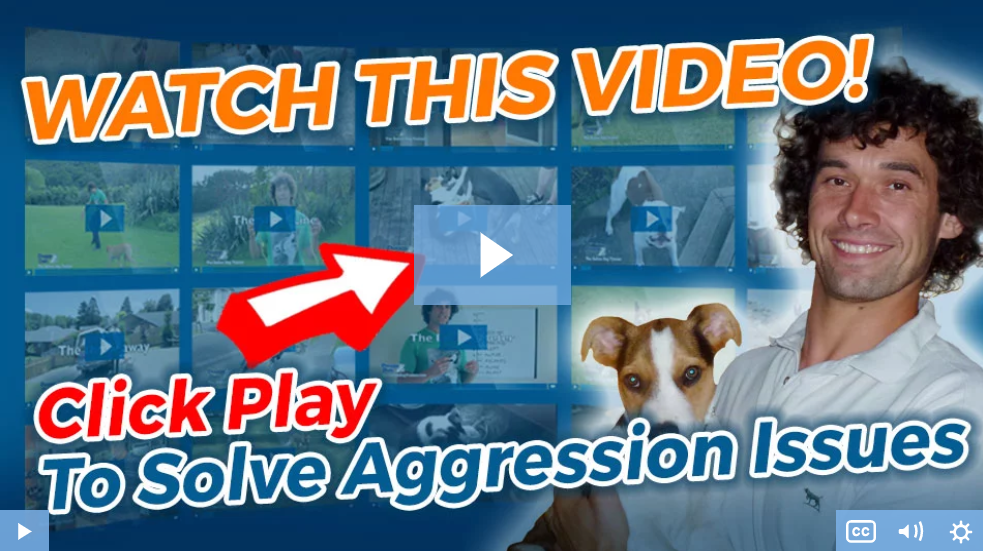If you’re sat at home googling “what to do with a dog that bites people” then welcome to the club.
Now, we all know that dog bites are no joke.
In fact, on average, between 4-5m incidents are reported per year, with around one in five requiring medical treatment.
Exactly what is the true figure depends on who you believe, but regardless, biting is a problem that needs to be resolved.
It’s not easy, and it will be stressful. But if you follow the advice below carefully, you’ll have a good chance of fixing the problem without recourse to more drastic measures.
Now, before we get into the ins and out of dealing with a dog that bites, first a quick heads up.
Although dog bites are a major cause for concern, they’re also something that can be rectified relatively quickly by teaching your dog to be calm and in control of their emotions.
So before moving on, I’d highly recommend taking a few minutes to check out the short video below from Dan Abdelnoor (aka Doggy Dan) over at The Online Dog Trainer.
During the video, Dan discusses how to quickly stop your dog’s unwanted biting by teaching them emotional control.
Watch the video, follow the training Dan recommends, and you’ll be surprised at how implementing what Dan teaches on your dog consistently can have a massive effect on their desire to bite.
Anyway, here’s the link to take a look: Click Here To Discover How To Finally Solve Your Dogs Obsessive, Unwanted & Dangerous Biting Habit… Even If You’ve Tried & Failed Before!
(video will open in a new window)
Why Do Dogs Bite People
Around two-thirds of dog bites occur within the family home and over three-quarters of incidents are directed towards family or familiar faces.
Surprising isn’t it?
People tend to assume that dogs bite strangers but clearly, that is not always the case.
So why do some of our furry friends sometimes bite? And more importantly, when does it become a serious problem?
There are a few key reasons why they may be susceptible or provoked into this kind of behavior…
#1 – Fear
Biting is a natural reaction to surprise and stress.
Unfamiliar situations (visits to the vet, entering new homes, etc) are going to make even the most placid dog on edge.
All it takes in such a setting is an unexpected shock (kids sneaking up on them, sudden loud noises, etc) for them to leap into an immediate defensive mode and lash out with their teeth.
You’ll find that this kind of reaction can be exhibited in all dogs irrespective of breed.
Socialization is by far the more important factor. And dogs who have only enjoyed a limited experience with new people, surroundings, sights, and scents are correspondingly the most likely to be easily shocked into biting.
For this reason (and many others) it is essential to encourage sociability from puppyhood onwards.
#2 – Possessiveness
While it is almost understandable to see why dogs may bite from fear.
When it comes to guarding favored toys, sleeping places, and most likely food bowls, it then becomes a much deeper problem.
Possessiveness is generally bred from anxiety caused by irregular routines and competition with other dogs.
For this reason and once again from puppyhood, it is important to discourage your dog from exhibiting guarding behavior.
As the pack leader you call the shots, and by no means should be scared to remove the food bowl as and when you deem fit.
It is relatively easy to train possessiveness out of most dogs but it must be approached carefully.
Read up on how to understand your pooch’s body language and the way they physically display a readiness to fight for their possessions.
#3 – ‘Hardwired’ Inclinations
This cause of biting separates dog behaviorists more than almost any other topic!
Some dogs, especially those adopted by humans to work, are liable to pursue and engage by sight.
From those dog’s perspectives, a passing jogger may be misinterpreted as a fleeing rabbit.
More seriously, small children can also be considered fair game.
It is unfair to label all dogs which fall into this category as being more liable to bite.
For example, greyhounds are generally chilled out dogs but many have a sight/hunt drive that can arise without warning.
So it depends a great deal on the actual dog.
But it is something to be aware of should you own or be considering housing a dog that falls into this category.
#4 – Pain & Discomfort
Generally speaking, this is a likely reason why dogs that may have never even snarled in the past suddenly begin biting people.
Dogs have a high pain threshold and will ‘soldier on’ in pain before letting their owners know something is seriously wrong.
Should your dog suddenly start to snap while being lifted or seem lethargic and grump during walks and playtime, take them to the vet for a checkup.
Remember to tell any kids to keep their distance over the wait for your appointment.
#5 – Maternal Duties
Should your dog have just given birth to a litter, the golden rule is to keep your distance!
Kids need to be told to allow her the chance to perform her natural duties and absolutely not to try and pick up and play with puppies fresh to the world.
No matter how well behaved your dog might be, there is going to be a high chance that they will physically react to anyone manhandling their pups.
Read up on how to handle birthing dogs and let her take her time.
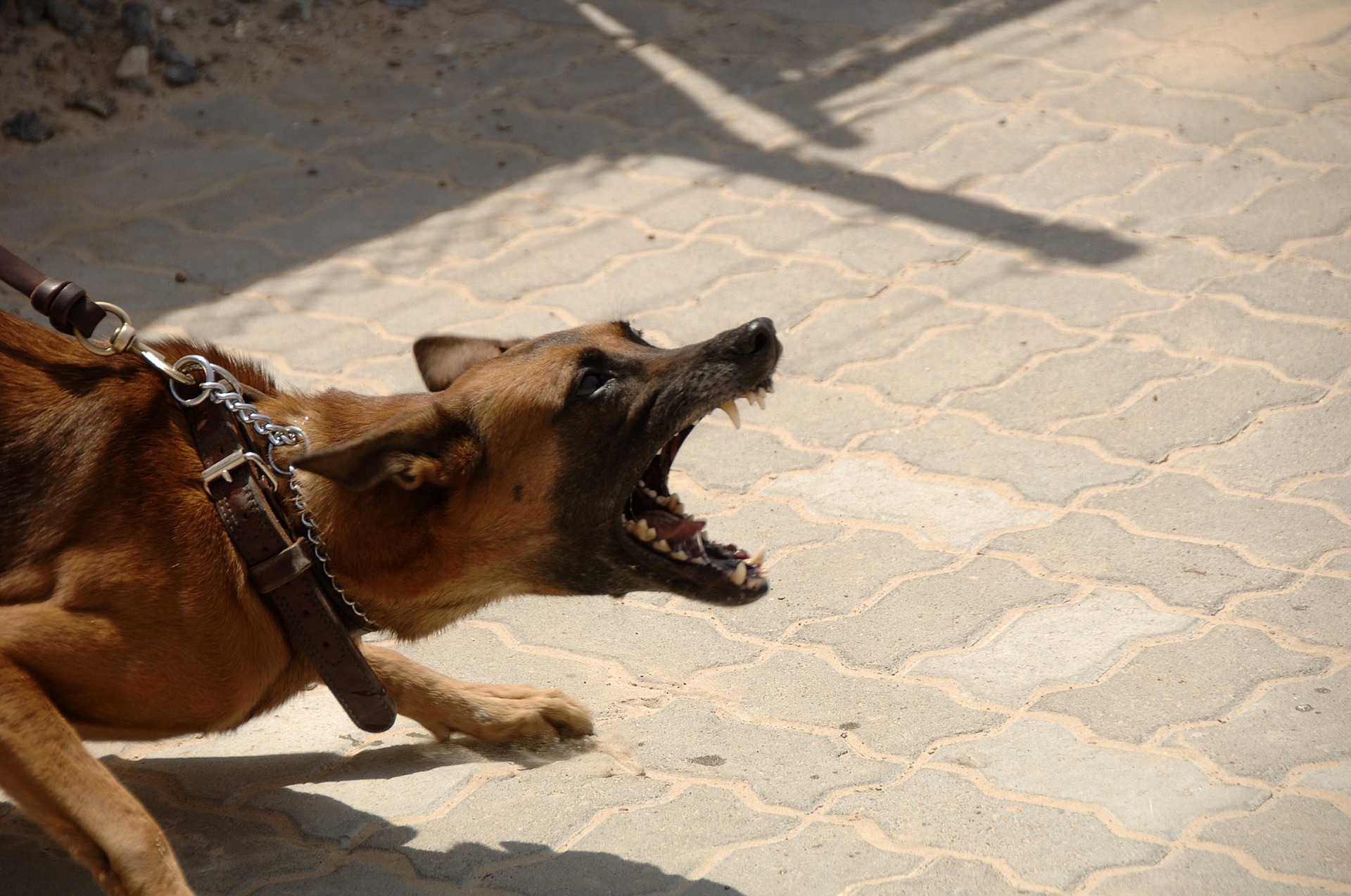
What To Do With A Dog That Bites People
So the first thing you need to do is establish if the bite was playful (remember many puppies don’t yet know their own strength) or aggressive.
Sometimes it’s hard to tell but you can often distinguish these by…
Playful Bites
- Light nibbles that should not break the skin.
- No display of their teeth before the bite.
- Relaxed body.
- Occurs during cuddles or playtime.
Aggressive Bites
- Hard bites and refuses to easily let go.
- Bares teeth prominently beforehand and exhibits a deep growl.
- Very stiff and tense body with an erect tail.
- Occurs when they feel threatened, anxious, confused, tired or in pain.
Always remember that it is natural for dogs to use their mouths to explore their environment.
It’s why they nibble and chew so often.
However, there is a clear line between exploratory or playful nibbles and aggressive biting. And the majority of owners will be able to distinguish that the moment it occurs.
Should your dog have had even one incident of serious aggressive biting then you have to accept that your bond of trust has been broken.
There is absolutely no guarantee that it will not happen again, and by association, the risk is that next time it may be even worse.
And if you have small children frequently around the house or smaller pets, you have a duty of care to isolate that risk from them.
There are three options for how to deal with your dog after it has bitten someone badly.
So consider these as guidelines that can be adapted for your particular situation.
And remember, there is no right or wrong answer here…
#1 – Tailored Desensitization Program
It’s difficult and will likely involve the use of a professional trainer, plenty of effort, and above anything else time.
But, desensitization programs – in this case establishing what drives your dog to bite – and working them out of their system can work.
While there is no guarantee of success and each course of action needs to be tailored to each particular dog.
These work by conditioning your dog to enjoy what had previously been causing them the stress that led to the biting.
Often referred to as ‘counter conditioning’, it can have remarkable success.
But regardless of how placid your dog becomes, you still need to monitor them carefully and be willing to isolate them during potentially stressful times (hosting guests etc).
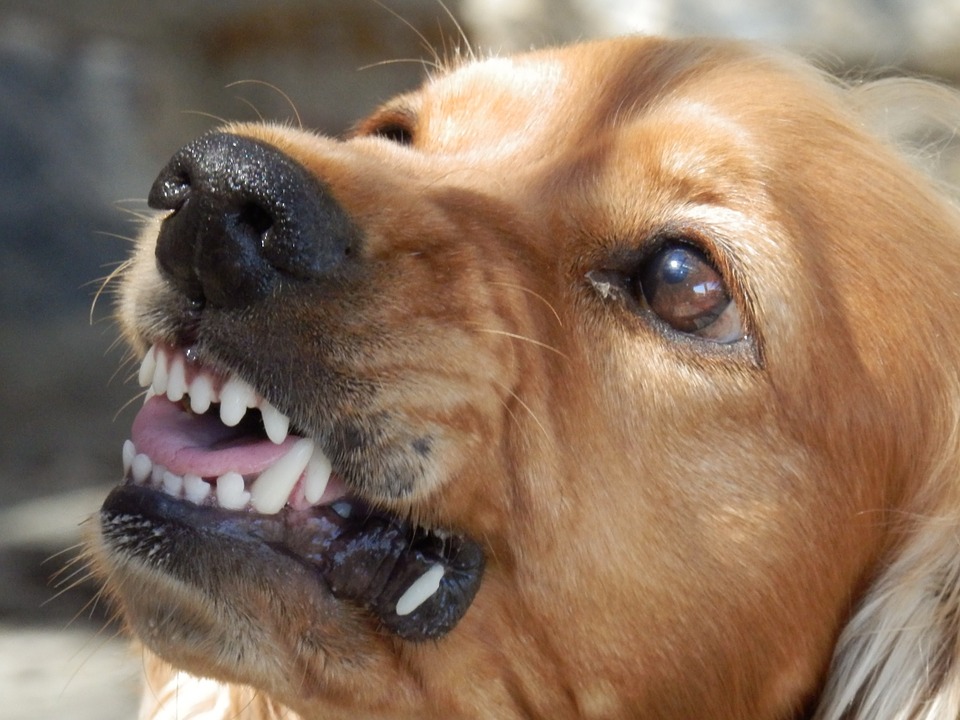
#2 – Manage Their Behavior
If your dog happens to have a biting tendency that is just too ingrained to be worked out, then it is your responsibility to manage their access to snapping opportunities.
Harsh as it may sound (and is) you need to severely restrict your buddy’s exposure to small kids, strangers, and other animals.
Some behaviorists claim that this should even include ending public walks.
Personally, I think this is a step too far but you will need to, unfortunately, use a good quality muzzle.
Be careful when selecting one as by no means are they ‘one size fits all’ and an uncomfortable one may make your dog even more stressed out.
But ultimately, it’s up to you to assess the situation and decide whether it is feasible to limit your dog in such ways while maintaining their quality of life.
#3 – Drastic Options
Should you take the tough decision and decide that it is untenable to live with a dog who has a history of aggressive biting, then it’s time to also remember some harsh facts.
Most rehousing charities/centers will simply not take on dogs with such a background.
They literally have millions of ‘normal’ (a word we hate to use in this context) dogs to rehome.
The alternative route is to look either for specialist organizations – these will often be breed-specific – or try and find someone privately willing to take them on.
Needless to say, this is an unknown quantity and can be difficult.
The alternative is to sadly look towards euthanization.
Before doing anything rash, be sure to have exhausted any viable alternative.
Your vet and local dog charities/groups will have plenty of resources that may help avoid this outcome.
Related Post: Putting Down An Aggressive Dog – Is Euthanasia The Best Option?
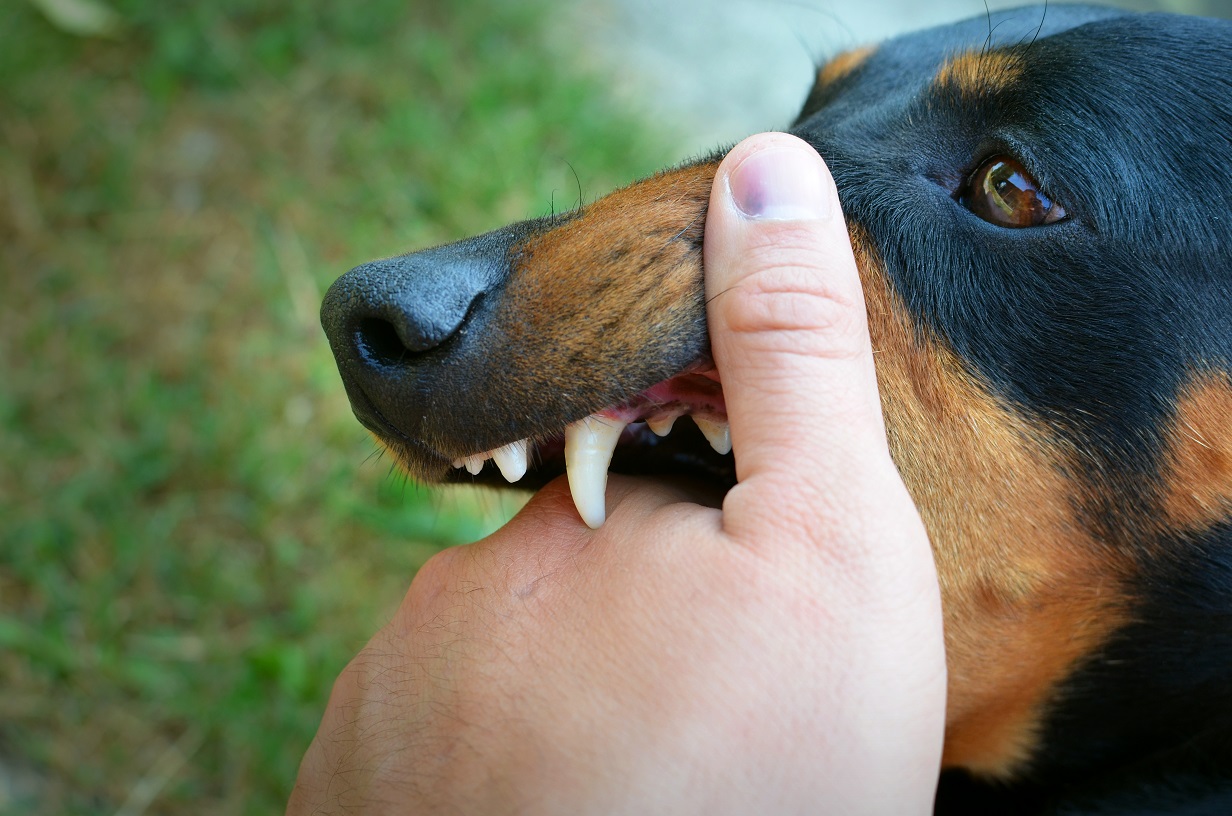
What NOT To Do When Your Dog Bites Someone
Let’s now roll back the clock a little.
Picture the scenario…
Your dog has just badly bitten someone without any physical provocation.
The natural reaction is to literally punish your dog into submission. Something that you may already have had to do if they would not automatically release their bite.
Now you MUST withdraw!
Any further shouting, screaming or worst of all physical engagement may well provoke the dog further and lead to even worse violence.
Should that happen, you can write off any chance of saving your relationship with your dog.
Forget the nonsense that some ‘experts’ claim that violent tendencies can be banished by beating your dog – it’s garbage.
Refer to the advice above…
Instead, let them calm down and isolate your dog indefinitely.
Now you have to establish what happened that caused their stressors to essentially overload and provoked them to bite.
Was the dog being excessively prompted to play or cuddle when not in the mood?
That may be the cause.
Are they in unfamiliar territory or encountering people they simply do not like?
Once again that may be the reason.
It could be something as simple as picking up the scent of another animal on a person’s clothes.
Establishing what this might be can be a tricky proposition so look for the clear-cut warning signs of aggression and readiness to bite.
Odd as it might sound, growling, stiffness, and displaying the whites of their eyes are good things!
They are communicating a stark warning that unless that stressor is removed they are going to attack.
Dogs that just suddenly snap without warning are a far more dangerous proposition and must automatically be considered a massive problem.
Whatever follows you need to understand that it only takes one bite to transform your doting domestic pet into a lethal predator.
And taking appropriate action is your call and responsibility.
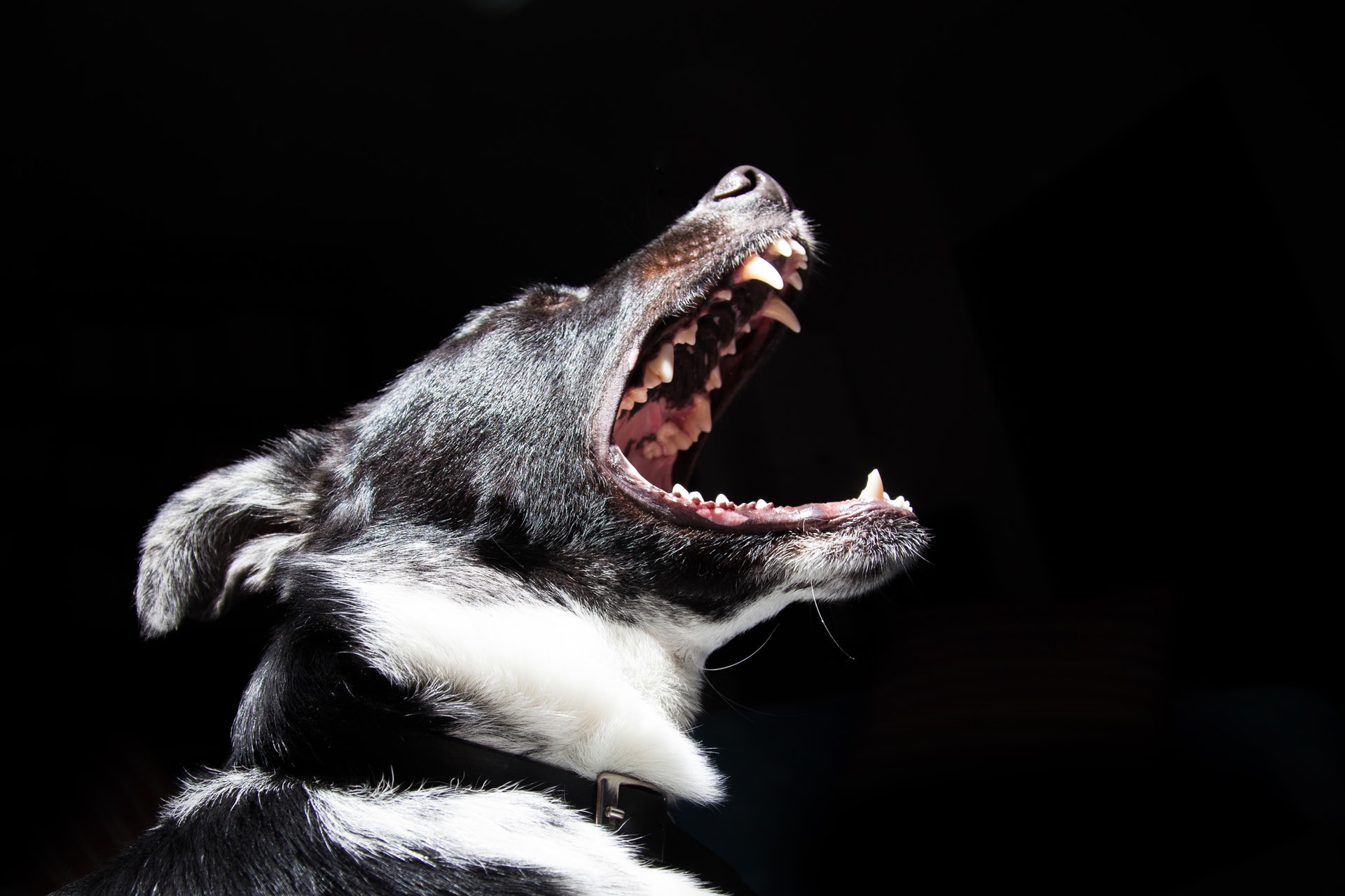
How To Stop Your Dog Biting People
The following advice is generally best applied before any potential biting event happens.
It may not be of much use after the event, but is something that all sensible owners will take on board when establishing a training and socialization routine appropriate for their dog.
Never forget that even if you are convinced that your dog can be ‘fixed’ and that the biting occasion is both understandable and totally out of character.
You never allow them to be unsupervised or off the leash again.
It should also be a priority to isolate them around vulnerable people, strangers, and during unusual situations.
#1 – Monitor Your Dog
We’re not just talking about a few days after the biting incident.
Even if they have not bitten anyone yet (and hopefully ever) you need to keep a close watch over how your dog behaves.
Take the time to learn about their body language and establish if there could be any environmental reasons which make them uncomfortable.
Is your dog naturally anxious?
This is displayed in many ways from food protectionism to separation anxiety.
If so, then you must take action to address this.
Perhaps your dog is usually fine and behaves well on their walks, but struggles when encountering new people/animals?
If this is the case then muzzle up and engage in some socialization classes Ideally ones that will also feature some command training.
You need to establish what makes your dog prone to biting and consistently work towards preventing this for life.
#2 – Consult Your Vet
Vets can either be very sympathetic to biting dogs or – from the owner’s perspective – pretty harsh.
Remember that they have a duty of care to their community, and may feel obliged to suggest drastic action should your dog have a history of violent behavior.
More sensitive vets will conduct a general physical examination to see if there are any identifiable reasons which may prompt your dog towards biting people.
It could be issues such as arthritis or digestion difficulties.
Or it may just be general grumpiness and unsociability.
Listen to their advice and if it doesn’t fit your opinion then consult also with local dog groups.
As mentioned above, you’ll be surprised how common this problem can be and chances are they’ll have some practical pointers.
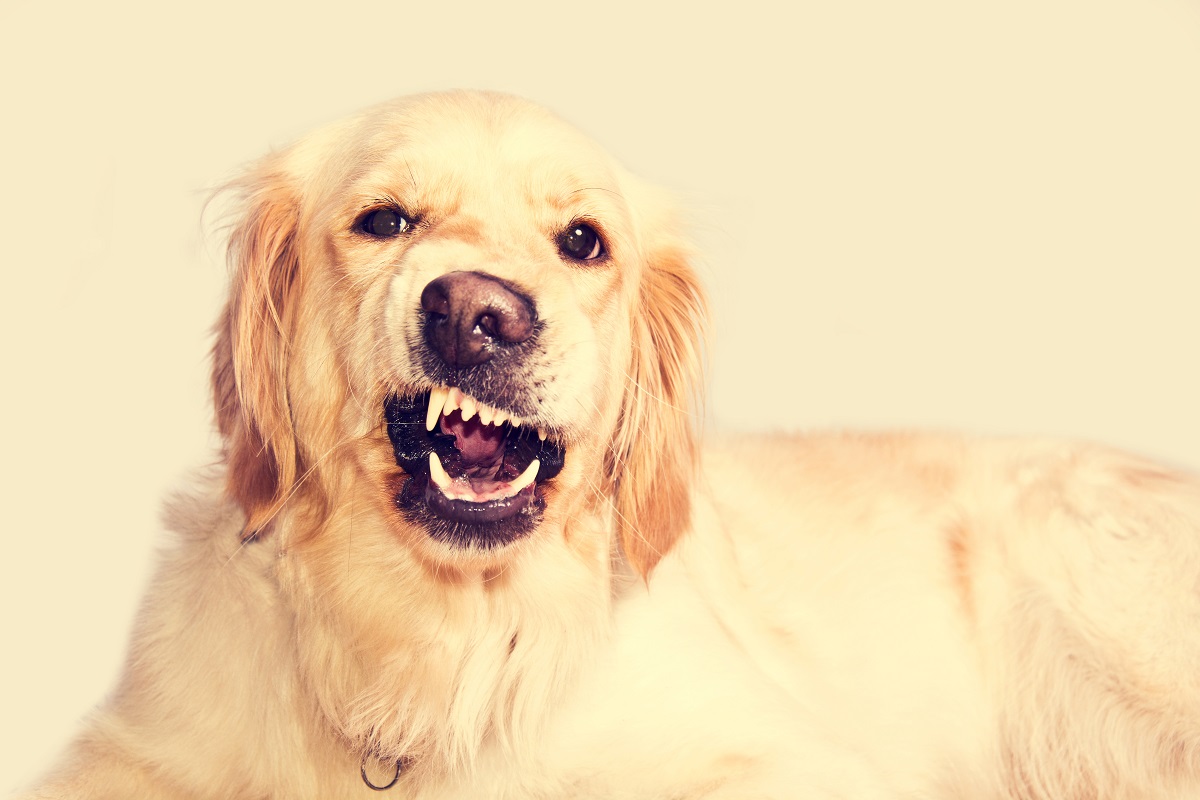
#3 – Take Up Professional Training
Find a qualified and recommended local trainer.
Any responsible service will declare that there is no guarantee that they will be able to ‘cure’ biting behavior for good.
But what they can offer is not just practical expertise, but most likely a comprehensive retraining program from start to finish.
This will include socialization aspects, and you’ll have plenty of homework to follow in order to help your pooch learn fast.
Needless to say, these can become expensive and you will still be obliged to isolate and muzzle up your dog when needed.
#4 – Confront Their Fears
Should you be fortunate enough to be certain of what makes your dog tempted to bite, then you can try and desensitize them yourself.
The best way to do this is by exposure.
Just be aware that your dog is going to be very stressed and may even attack you. So a muzzle and gloves are important considerations.
If your dog is startled by joggers then take him for walkies with a friend who will jog just ahead of them.
Keep them on a tight leash and slowly repeat becoming close and then distant from your jogger.
Repeat this from various directions, around corners, and consistently for many walks and your dog will eventually figure out that there is no threat.
Just don’t assume that they are forever going to be cured. You will still need to take precautions.
Whatever startled and stresses your dog, use your imagination to find a safe way to expose them to the ‘problem’ and time to realize that there is no threat.
It does not work 100% of the time but is worth a try.
#5 – Inhibit Biting & Use Commands
Biting can be a particular problem in very young puppies once they have been separated from their litter.
When they are with their brothers and sisters, they learn the limits of biting by yelping when it becomes too hard.
If they are alone, it is down to you to help them understand these limits.
When playing with your pup and they nibble too hard, just make your hand limp and 99% of the time they’ll immediately stop and become worried they have killed the hand that feeds them.
Perform this every time and it’ll quickly become very rare.
Should they keep at it, incorporate this into your command training by saying “Stop” or “Freeze” when going limp.
End all playtime until they cooperate.
Remember to positively reinforce good behavior during playtime with special treats and praise.
Get this stage right and there is a far lower likelihood that your pooch will bite when they hit adolescence.
#6 – Play To Discourage Biting
Dogs of all ages are going to love to bite and gnaw on their favored puzzles and toys.
But relying on these alone is not a good idea. After all, we don’t want our dog to become too fixated or comfortable with biting anything that moves.
So mix up your playtimes by incorporating more physical activity.
Something as simple as a game of fetch can be turned into retrieval commands.
Cycling or running with your dog is going to tire them out enough so that come home time, they’re not going to feel much in the mood for a fight (just don’t press them beyond fair limits).
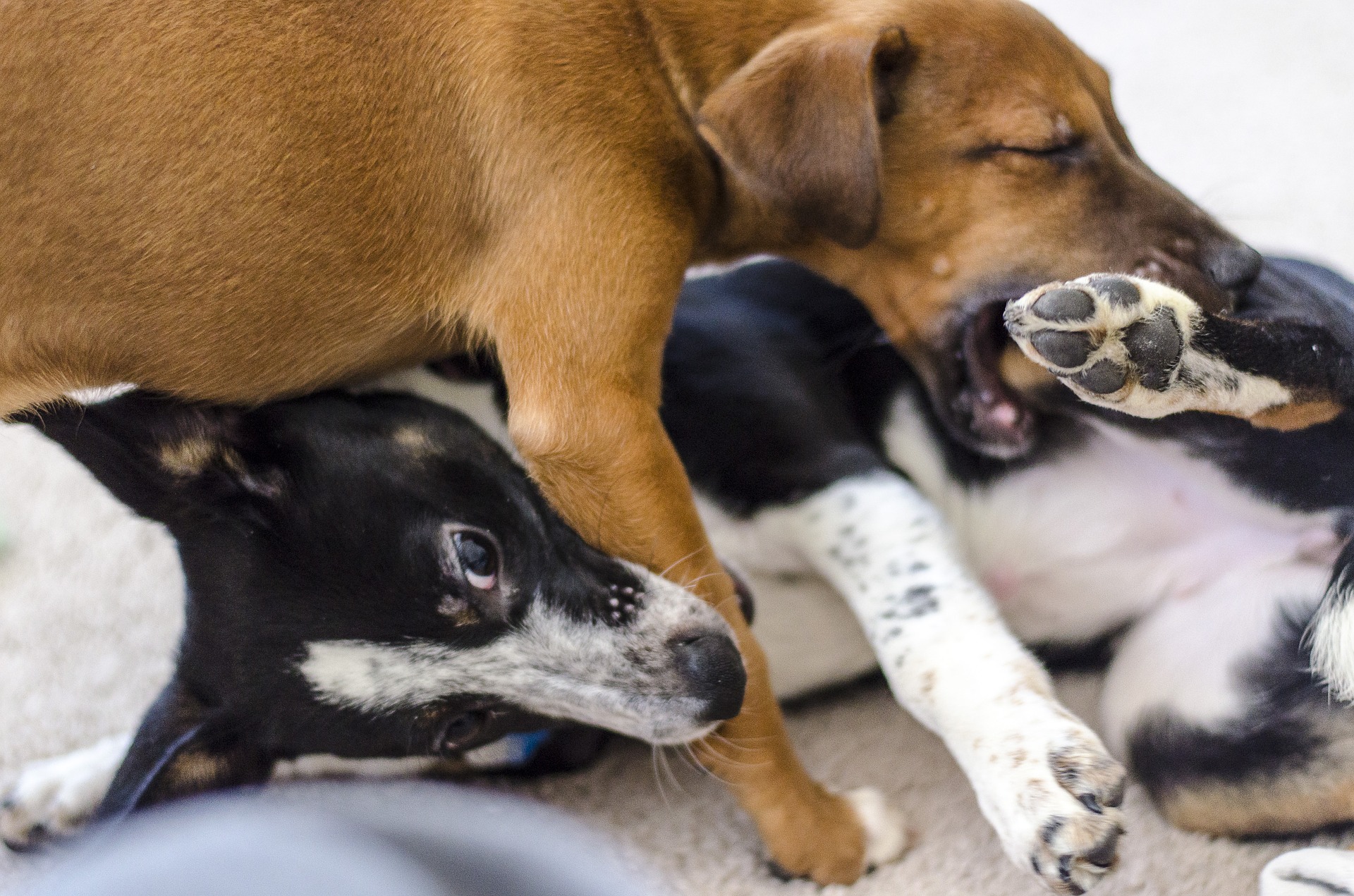
Wrapping Things Up
It takes a strong-willed owner to effectively cope with a dog that bites people.
Prevention is always better than cure and one of the reasons why socialization and exposure are absolutely essential towards developing a happy and well-mannered dog.
How you cope with a biting incident depends greatly upon your personal circumstances and the nature of the pet.
In some cases, it may be possible to help them understand that such behavior is unacceptable and this can only be achieved through diligence, effort, and quite possibly professional assistance.
Do not automatically lose hope should your dog bite someone.
No dog does so for ‘fun’ – there is always a reason and it is your job to figure out what this was and whether or not it can be effectively resolved.
Do you have any thoughts on what to do with a dog that bites people? Let me know in the comments below…
